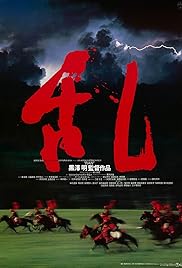RAN
(director/writer: Akira Kurosawa; screenwriter: based on William Shakespeare’s play King Lear; cinematographers: Asakazu Nakai/Takao Saitô/Masaharu Ueda; editor: Akira Kurosawa; music: Tôru Takemitsu; cast: Tatsuya Nakadai (Lord Hidetora Ichimonji), Akira Terao (Taro Takatora Ichimonji), Jinpachi Nezu (Jiro Masatora Ichimonji), Daisuke Ryu (Saburo Naotora Ichimonji), Mieko Harada (Lady Kaede), Yoshiko Miyazaki (Lady Sué), Hisashi Igawa (Shuri Kurogane), Peter (The Fool, Kyoami); Runtime: 160; MPAA Rating: NR; producers: Serge Silberman/Masato Hara; Winstar Home Entertainment; 1985-Japan/France-in Japanese with English subtitles)
“A stunningly beautiful epic.”
Reviewed by Dennis Schwartz
Japan’s greatest living director, Akira Kurosawa (“Yojimbo”/”Stray Dog”/” Red Beard”), at the ripe old age of 75 and in his 27th film, once again turns to Shakespeare as he did some thirty years ago for Throne of Blood and again proves he’s about as good a cinematic adapter of the bard as any filmmaker in this fascinating retelling of Shakespeare’s “King Lear”. It keeps most of the bard’s main themes intact, as Kurosawa only changes the play’s daughters to sons and the setting to feudal Japan. Kurosawa shoots a stunningly beautiful epic with spectacular bloody battle scenes, that cost $11 1/2 million–$7 million from Japan and the rest from France. It was the most expensive film ever made in Japan. The title can be translated to mean chaos.
It’s set in 16th-century feudal Japan. The vain and arrogant tyrant, Hidetora Ichimonji (Tatsuya Nakadai), is an aging warlord suffering from senility who has acquired power through fifty years of ruthless bloodshed. He has a dream and announces that he will divide his kingdom among his three sons–the eldest Taro (Akira Terao), the middle son Jiro (Jinpachi Nezu), and his youngest son Saburo (Daisuke Ryu). Each will dwell in one of three outlying castles (they were filmed at the ancient castles at Himeji and Kumamoto; the third castle was constructed of plastic and wood on the slopes of Mount Fuji). But the aging lord believes the false flattery of his treacherous two older sons, and hands over power to his eldest son Taro (Akira Terao). The only son loyal and truthful to him the youngest, is unfairly banished from the kingdom for mouthing off that his dad’s plan stinks as it will only lead to strife; while the other two brothers violently feud over the spoils and ridicule their frail father and both refuse to give him shelter in their castles, as the lord’s kingdom is torn asunder by greed and the bitter rivalry. The now to be pitied lord soon finds himself exiled from his own kingdom, and wanders the barren land with time on his hands to go over his foolish and misguided life.
The evil Lady Kaede (Mieko Harada) is the power-hungry and vengeful wife of the oldest son Taro, who influences two of the brothers with her cunning seductive ways. A transvestite actor by the name of Peter, plays the fool with wicked fun.
The graphically violent epic story of ambition, vanity, false pride, and aging, brings Kurosawa to new heights in stylishly visual filmmaking and in getting on the screen some deeply moving passionate characterizations.

REVIEWED ON 9/19/2008 GRADE: A-